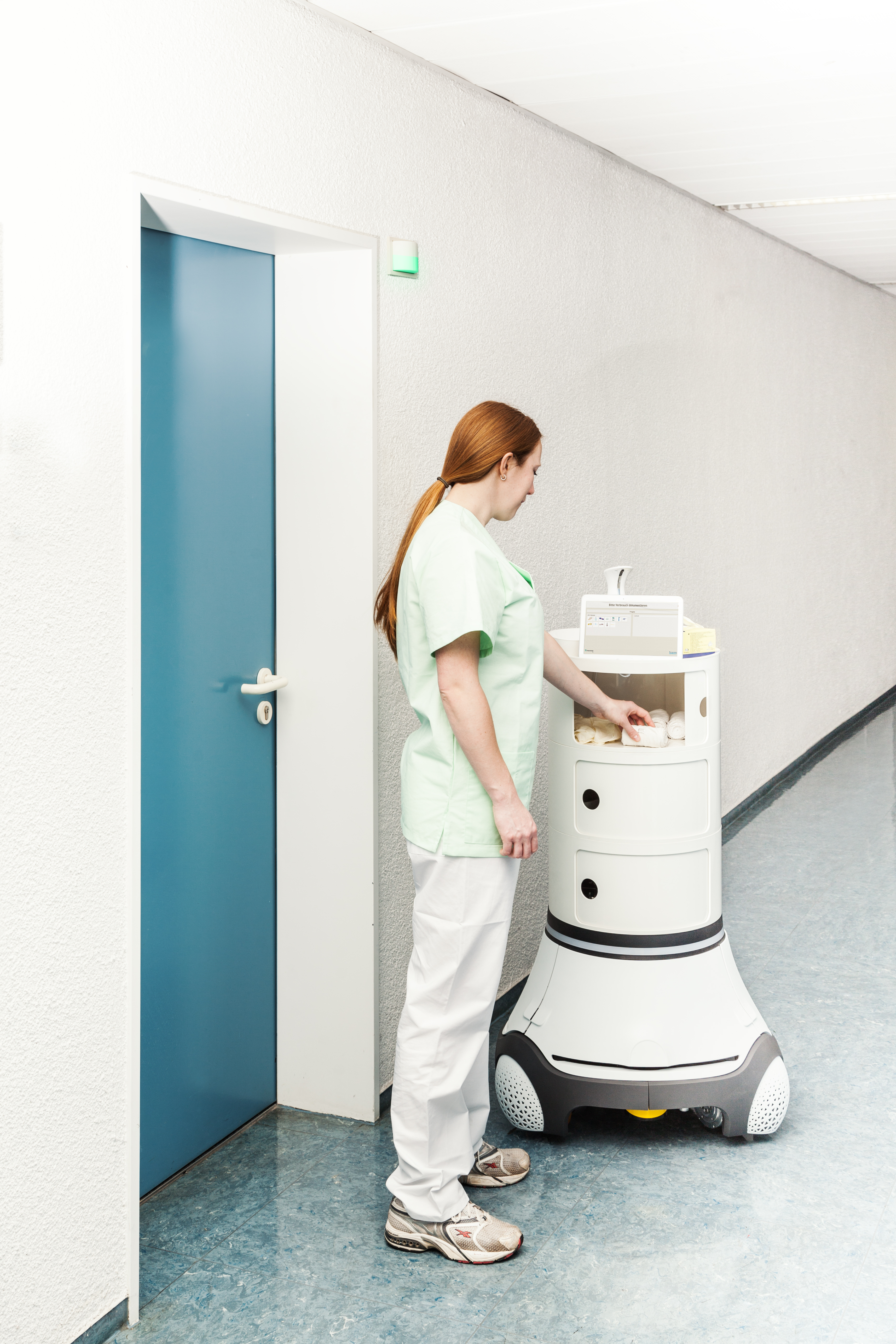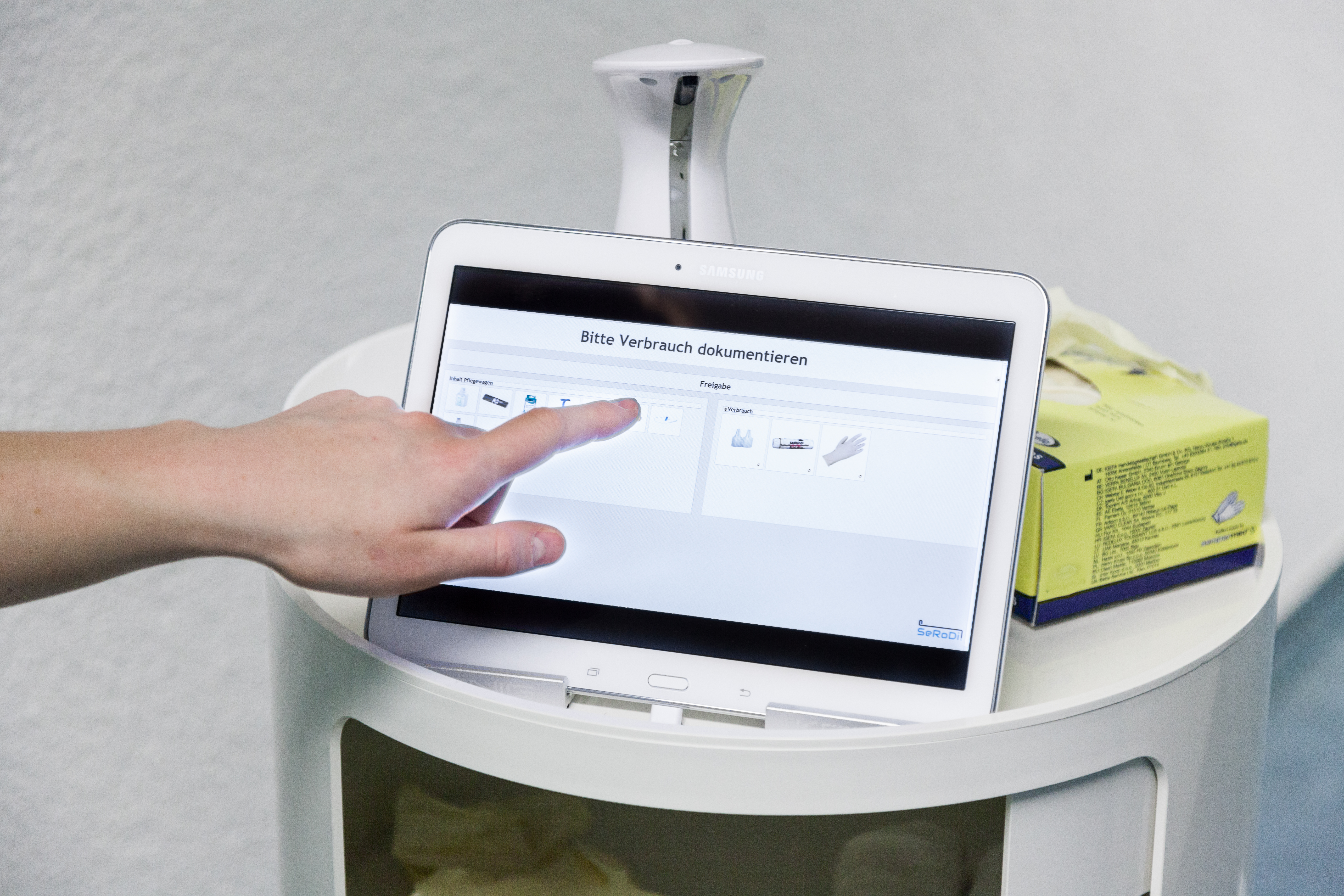Fraunhofer IPA develops prototype of intelligent care cart
It comes when called, bringing care utensils with it and recording how they are used: Fraunhofer IPA is developing an intelligent care cart that provides care staff with physical and informational support in their day-to-day work. The scientists at Fraunhofer IPA have now completed a first prototype. In doing so, they are continuing in their efforts to improve working conditions in the care sector and are developing solutions designed to address the challenges of demographic change.


Technical assistance systems can improve the difficult working conditions in residential nursing homes and hospitals by helping the staff in their work and reducing their workload, thereby giving them more time to interact with patients and residents. Great potential for workload reduction, in terms of both health benefits and time savings, is offered by the actual nursing process, which is where the intelligent care cart is designed to help.
In a first prototype, the scientists at Fraunhofer IPA have equipped the mobile platform of the Care-O-bot® 4 service robot with a new body that can be stocked with care utensils. If the care cart is connected to the call system of the care home or hospital, it can travel automatically to the room from which the patient has rung. The built-in touchscreen allows the care staff to confirm their presence and, once the robot is no longer required, to free it up for its next assignment. In addition, the carer can use the display to easily record which care utensils they have consumed.
Improvements for day-to-day work
Conventional care carts do not offer optimal assistance for care staff. Especially in an emergency, the cart is often not where the staff need it to be. Also, it is often insufficiently stocked with supplies. This costs the staff valuable time, because they first have to go and fetch any missing supplies from the storeroom, which can involve walking long distances inside the care home or hospital. Even if electronic media are used, it takes the care staff a lot of time to record the kind of care they have administered and the supplies they have consumed, which is why they are often forced to carry out such work after the end of their shift.
“Our goal is to further develop the care cart in such a way that its intelligent assistive features facilitate the day-to-day work of care staff. For example, the cart should always be where the nurse needs it to be. This saves legwork,” explains Dr. Birgit Graf, Group Manager for Domestic and Personal Robotics at Fraunhofer IPA. For this purpose, the cart is equipped with a navigation system to enable it to travel autonomously to where it is needed. Any obstacles it encounters on the way are automatically detected and avoided. As an alternative to being connected to the call system, the cart can also be called using a smartphone.
In subsequent stages of development, there are plans to design the cart to automatically follow the care staff. A fully automated mechanism will enable the cart to make supplies available to the nurse in an ergonomic and hygienic manner. The nurse will record the care they have administered directly in the patient’s room using the display on the care cart. Finally, the scientists at Fraunhofer IPA plan to study the possibilities for connection to an automated central storeroom that will restock the care cart, electronically monitor inventories and reorder as required.
Care cart as part of the “SeRoDi” project
The intelligent care cart is being developed as part of a four-year collaborative project called “Service Robotics for Assistance with Personal Services” (SeRoDi). The German Federal Ministry for Education and Research (BMBF) is supporting the project with almost three million euros. Fraunhofer IPA is collaborating with the Institute for Control Engineering of Machine Tools and Manufacturing Units (ISW) and the Institute for Human Factors and Technology Management (IAT) from the University of Stuttgart, the University of Greifswald as well as Altenpflegeheime Mannheim (Mannheim Nursing Homes) and the University Clinic of Mannheim as end users.
The goal is to implement three application scenarios from an everyday nursing environment and, in several evaluation cycles, to study the extent to which the new technologies can deliver improvements in the day-to-day work of the staff. In addition to the intelligent medication cart, the project partners are working to further develop the multifunctional “ELEVON” lifter, which is equipped with assistive features designed to help care staff with the lifting and transport of patients. The third application scenario involves a “mobile kiosk”, which, when called, can bring such items as snacks, drinks or magazines to the residents or patients either in the lounge or directly to their bed.
Wider dissemination of service robots
The project partners plan to leave the implemented assistive systems in the care homes or hospitals after the end of the project in order to allow them to be used, among other things, as demonstrators for other homes or hospitals. “We hope that the SeRoDi project will not only lead to the development and testing of new applications, but also enable us to gain new development and application partners in an effort to further promote the use of service robots in the medical and care sector,” emphasizes Birgit Graf.